Hi friends. I hope you had as good of a week as I did, because on Saturday I had the privilege of playing the epic TWILIGHT IMPERIUM: 4TH EDITION!!!!
than that to impress me, you conniving, fremen-ripoff space lion son of a—
For the uninitiated, Twilight Imperium is infamously one of the most epic/expansive/expensive board gaming experiences the art form has to offer, with our playthrough clocking in at a whopping 14.75 hours. And I gotta tell you, I loved—
So true triceratops… hey! Maybe they’ll put a triceratops in the next TI expansion, where you can play with 9 players for 20 hours!
Okay. In all seriousness, I’m going to tell you why I LOVED this game that was difficult, cutthroat, and long, all things I normally don’t enjoy.
The Lazax, the last empire to rule the galaxy, have fallen. Now, the intergalactic custodians are holding an interstellar tournament to see which of you starving, backwater civilizations is worthy of the throne. Will you claw your way to the top? Or will you be banished to the annexes of history?
I played as the Universities of Jol-Nar, a species of sentient fish people responsible for most of the technology in the galaxy. After the fall of the Lazax the Jol-Narians retreated to their tanks, hoarding their knowledge for themselves. But now that the Lazax have finally exhaled their final breath, it’s time to see if Jol-Nar can bring about a new Age of Enlightenment.
Before playing, I had watched a strategy guide saying that you should shoot for scoring one point per round, with the winner being the first to score ten points. I was able to score two points the first round, bringing the Jol-Narians to an early lead. But I was quickly overrun by the Clan of Saar, nomadic space-monkeys who, in a brilliant sweep, made a mad dash for Mecatol Rex in the third round. None of us at the table could believe it, Derrick had already claimed the ancestral seat of the Lazax, and scored an extra point for it!
Derrick, corralling myself and our mutual neighbor Zack into an alliance, took a decisive lead. But as the rest of the galaxy hurled their forces at Mecatol Rex in an effort to unseat Derrick from his throne, Zack and I were looking at the points track. Neither of us had forgotten that we were each only one point behind Derrick, and only three points from taking the throne for ourselves…
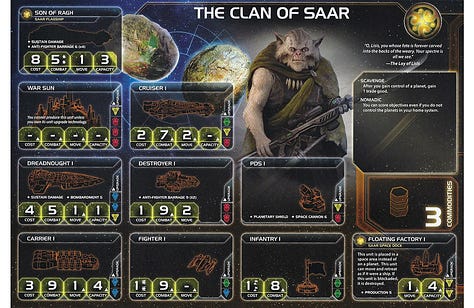
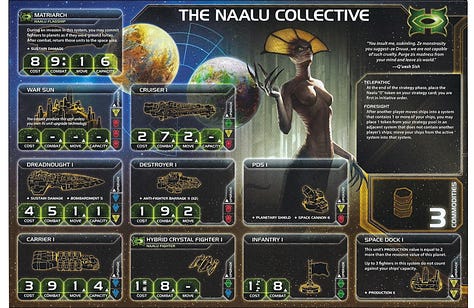
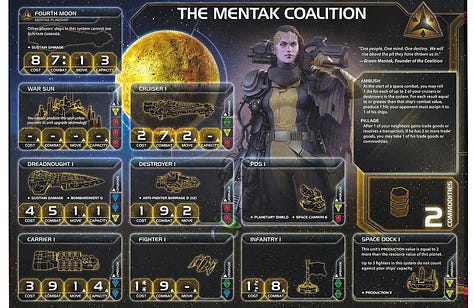
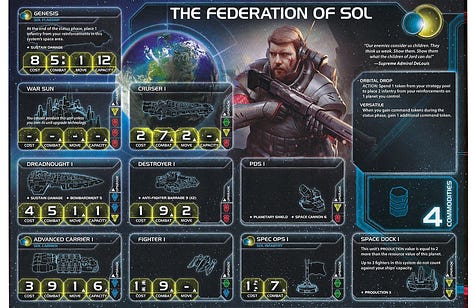
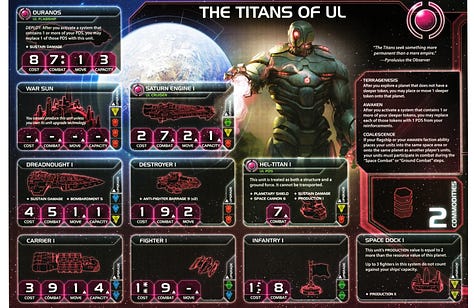
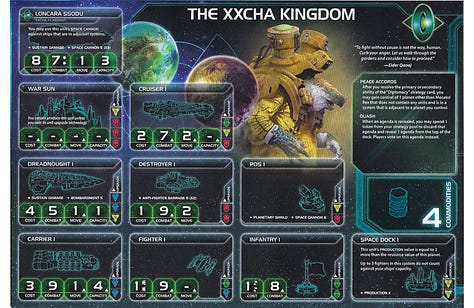
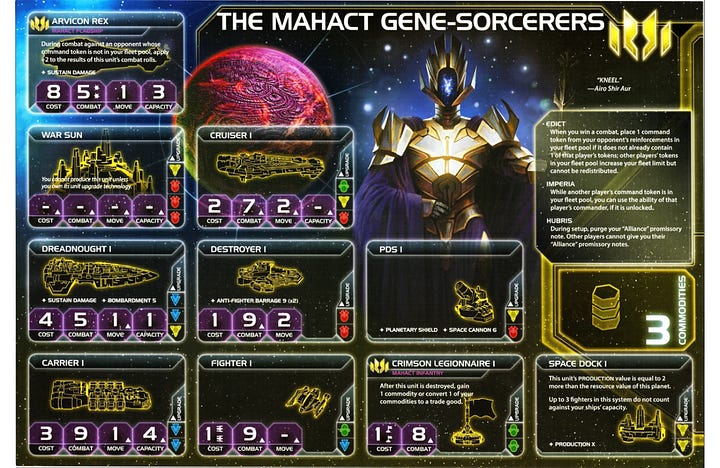
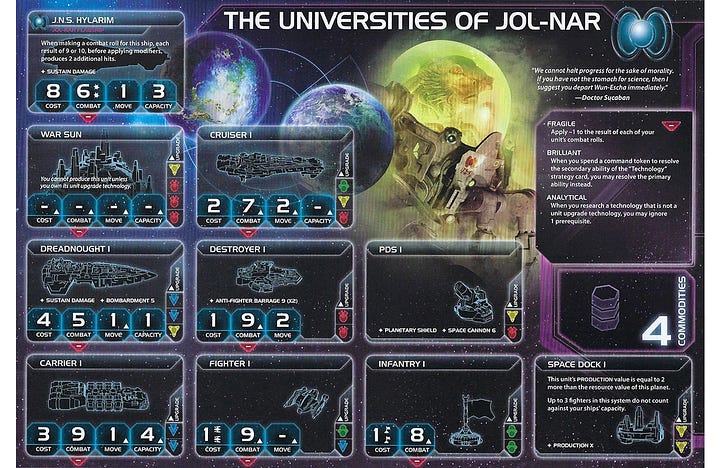
The next round, I began frantically counting my pieces. “Eureka! I can win this round!” I exclaimed. In science, this would be the sound of a great success. But in the Twilight of the Lazax Imperium… At the tenth hour (literally), my other neighbor Chuck brought the might of his forces down upon my ships like the College Republicans holding a debate against liberal arts students. Not even space fish can withstand College Republicans.
I was, and I say this seriously, crushed. I had come so close. I had been ecstatic with the possibility of winning, probably the most excited I’ve ever been playing a board game, only to have everything taken away. But as the game continued into hours eleven and twelve, with no clear end in sight, I realized that I had in fact not been worthy of the throne.
Twilight Imperium is a very impressive game out of the box, with 17 different alien races to play, hundreds of plastic ships, and galaxy tiles that will fill your table. Ultimately, these are all a distraction. TI4 is not a game about space battles, or conquest, or expanding your empire. It is not a game about honor, or valor, or taking Mecatol Rex. It is a game about patiently pretending to be weak, until your opponents cannot deny that you are strong. It is about quietly waiting for your opponents to expend their weapons on each other, and then using your own to devastating effect. This is exactly what Chris did when he brilliantly took the win in hour 15.
My fatal mistake, as well as Derrick’s, was that the most important part of TI4 is the invisible political dimension that hovers over the board. The game is filled to the gills with ways for players to specifically deny someone else from winning, so the person who eventually wins is the person who either convinces everyone else to turn on each other, or the person who safeguards themselves against every possible eventuality. Chris did both of these, only proclaiming the win when he was sure he couldn’t be stopped.
Even though I spent most of this game thinking in terms of plastic and points, the evocative force of Twilight Imperium struck me like a zoogat crusher eating a gorgnak deebok in the seas of Jol-Nar. You can only win TI4 if you are actually recognized as worthy by the rest of the galaxy, represented by the other players at the table. And because the game is so long, earning this respect feels like you really fucking earned it. So is TI4 long? Yes. Is it complicated? Yes. Is it difficult to find a group to play it with? Probably. But I will say that hands down, it was the most epic, evocative, and exciting experience I have ever had playing a board game. It was awesome. If you have the opportunity, you must try this game.
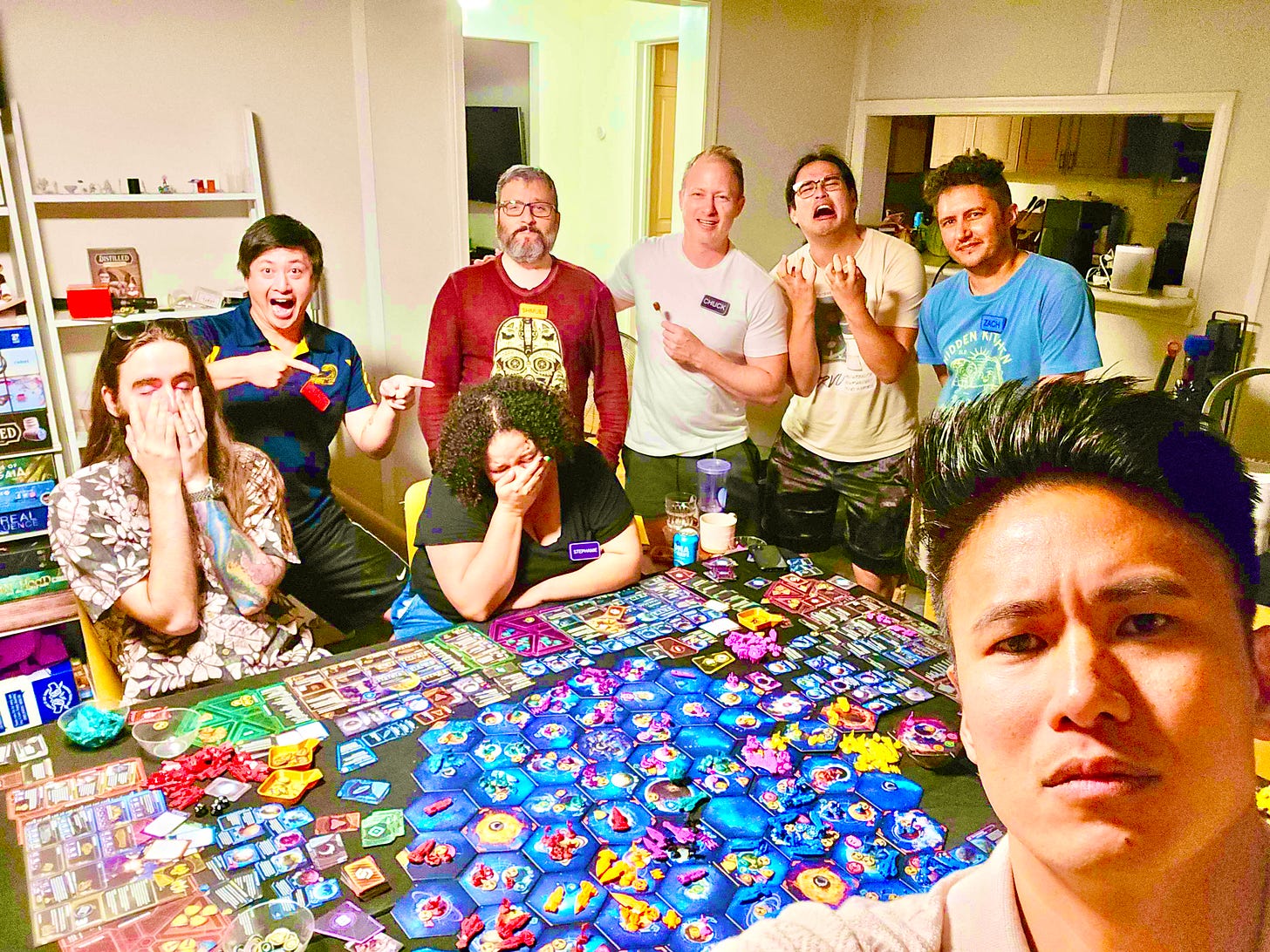
Derivations on a Theme (on being a part-time genius)
In discussing last week’s chapter of Into the Woodlands, a friend told me that he found it “incredibly tropey.” This wasn’t necessarily a negative or a positive in his opinion, although I think we both share the desire to see things that are surprising and new. And since I’m sometimes known as someone who is a Large And Vocal Hater Of All Things Derivative, I thought I’d talk a little about tropes and my writing process.
Like description, narration, dialogue, and punctuation, tropes are one of the many tools that writers have at their disposal. Profanity, breaking the fourth wall, telling things out of order, and reliance on tropes are tools that some think are unfashionable. Of course, this isn’t universally true. The question becomes when to follow what people think are the rules, and when to break them. And oh, how I love breaking them.
Something I encountered in my college writing classes was that many of my peers did not pick up on subtext that to me seemed glaringly obvious. “How could they,” I thought, “not recognize my unbridled genius?!”
Of course, what actually happened was that I had failed to clearly communicate my ideas on paper. But what exactly does “clear” mean? Even after revising to a point that felt to me bordering on condescending, I still often got feedback that people didn’t understand what I had written. Why was that?
The lesson I learned is that everyone has their own level of narrative literacy, or the ability to understand the subtext and context of stories. In college, I often wrote experimental fantasy and science fiction to an audience not familiar with either. In one class, I turned in a comic with simultaneous timelines that to me was cool and innovative. To my classmate who had never read a comic book before… Well, I learned my lesson. If I am going to do Weird And Experimental Things in this blog, I’d like to prepare everyone for my inevitable plunge into avant-guardeland.
So what is a trope? Basically, it’s a good idea that has been used lots of times. The hero who saves the day is probably a good idea you’ve seen lots of times. When we meet someone in a story who is brave, we probably expect that they will save the day, and that they will live happily ever after.
But what if you’ve never read any stories with heroes, or bravery, or happily ever after? What if you’ve only read stories about cowards and villains and misery? To you a Superman or Luke Skywalker might seem a genius invention, avant garde, or even distasteful. Some of you may read Chapter 1 of Into the Woodlands and say, “Hey this is almost exactly Mouseguard.” Those of you who don’t know Mouseguard, a comic about a fantasy civilization of mice who have rangers that protect their society, might think I’m a genius.
From the moment I read the Mouseguard comic, where several mice warriors fight a snake, I thought, “This is stupid. Mice shouldn’t be able to fight a snake! I’m gonna have them ride it instead.” When we then played the Mouseguard role-playing game, and I introduced a villainous mouse riding a snake, I was proclaimed a genius by those same few who called me a boot-licking derivite last week. What gives?!
To those who have recently seen or read Frank Herbert’s Dune, a mouse riding a snake might seem like an obvious reference to the Fremen riding sandworms. To those of you familiar with fantasy fiction, it might seem similar to a young human riding a dragon. Of course, Herbert actually stole the sandworm from Mongolian mythology, and I by no means invented the mouse or the snake, so…
To some, tropes are repetitive and boring. To some, they are comfortable and accessible. To others, they’re eye-opening and interesting. As a writer, I don’t know which one you will think, so I try to balance all three. My thinking on this is pretty much based on three quotes from this video:
“As creators, we’re only as good as the obscurity of the references we steal from.”
“Steal from stuff that’s too obvious, and everyone knows and thinks you’re derivative. Steal from stuff one’s ever heard of, and you’re a genius.”
To those of you who thought Chapter 1 was tropey, my goal is to increase the complexity of the story over time so that those of us less familiar with fantasy and interactive stories can have just as much fun. And when I introduce the central tension from the Lord of the Rings, many of you who called me a boot-licker will proclaim me a genius, even though I am not. Here’s how the conversation will go:
Probably Caleb or Joel: “Hey, when are you going to introduce the central tension from the Lord of the Rings like you said?”
Me: “I already did, like five chapters ago.”
Them: “No way.”
Me: “… yup. Yup way.” (California yup)
Let’s call it a race. If you notice first, you can get a gold star, and I’ll be a Certified Derivite. But if nobody notices… well, you can still have the satisfaction that I am indeed that accursed class of writer…
Lastly:
“Take the things you like, and put them in your game.”
I’m gonna take that mouse, and I’m gonna put him on a snake. Yeah, that’ll be cool. And then I’m gonna do this, and they’re never gonna expect it when he’s secretly a that, oh, and they’re gonna poop their pants when they find out that the snake rider’s daughter was secretly a this the whole time…
Into the Woodlands, Chapter 2: The Law of the Jungle
Into the Woodlands is an interactive story, where you choose what happens next. You can click here for Chapter 1, and here for the compendium. Enjoy Chapter 2!
Dear Reader,
I think it is fair to say that Old Man Muck’s life has been defined by nigh-improbable acts of chance. Himself a happy accident, Muck Turtlequeue began gambling almost directly out of the womb, choosing to drink tree sap instead of his mother’s milk.
“I’m worried, Marge. What kind of mouse doesn’t like to suckle on his mother’s milk?” Said Morg, Muck’s father.
“I have no idea.” Said Marge. “It was a small litter this season, so I have enough teats for everyone. He just seems to not give a damn.”
“Well, I’ll go and grab him. Maybe he’ll do things right this time.” Said Morg. He was the kind of mouse who gets things done, who takes things into his own paws, even when he has no chance of changing the outcome. So he and Marge were both astonished when, even with mother’s teat shoved into his mouth, Muck refused to drink a single drop of milk!
“I can’t believe this! It’s like he wants to die!” Said Marge.
Well, this wasn’t quite true. It wasn’t that little Muck had a death wish, but more that he felt magnetically pulled to that precarious edge between life and death. And so, after many falls from great heights and near-drownings, all of Barnyarn was astonished when Little Muck had invented something most peculiar.
“You see, this rock is called a ‘die,’ and it has twenty sides.” Said Muck, to a growing crowd of other children. “Each side has a number written on it, so when you roll the die, you get a number, but you don’t know which one! Isn’t that great? You don’t know which one!”
Often, we may wonder why it is that we have been put on this planet, and for what task. We have religion, or science, or our parents to tell us this or that. I am here, my dear Reader, to tell you that Muck Turtlequeue was born to invent gambling.
Within a season, Little Muck’s new invention “Mucklebones,” a cross between marbles and a slot machine, took the Woodlands by storm. Imagine if soccer or baseball was suddenly invented in your neighborhood, but with more gambling. Well, more gambling than it already has. You know what I mean.
The unfortunate truth is that despite inventing the game, Muck had little luck at Mucklebones. In fact, he had likely the worst luck imaginable, and by his twelfth season Old Man Muck owed one of his daughters to no less that 75 separate witches. 75! So it may come to you as no surprise that to settle his debts across the Woodlands, Muck found himself in a predicament unlike any mouse before. This is how Old Muck found himself at the maw of the rat snake Agatu.
My dear Readers, it is my job to tell you the truth, even when it is ugly. This is the truth: when it comes to mice, a rat snake is devious, lazy, and mean, in that order. So when a mouse came to Agatu’s den with a rather nefarious proposition…
This is how it came to be that Old Man Muck rode into the town of Barnyarn riding Agatu the rat snake.
“Cower in fear, citizens of Barnyarn! At long last, you shall point at laugh at me no more!” Said Muck, riding Agatu past mice fleeing in terror.
Skeet, a young Ranger mouse, came running toward the commotion. As humans, we are lucky enough to live on a planet where there are not many creatures twenty or thirty times our size who consider us lunch. This is not the case for the humble mouse. No, dear Reader, the mouse lives in fear of the snake. The snake lives in fear of the eagle, and the eagle lives in fear of none. This is the Law of the Jungle.
Skeet’s training did not prepare her for a mouse breaking the Law of the Jungle.
That’s it. See you next week!











I can’t help but notice that Into the Woodlands is written from the perspective of a (human?) narrator. Will we learn more about this character?